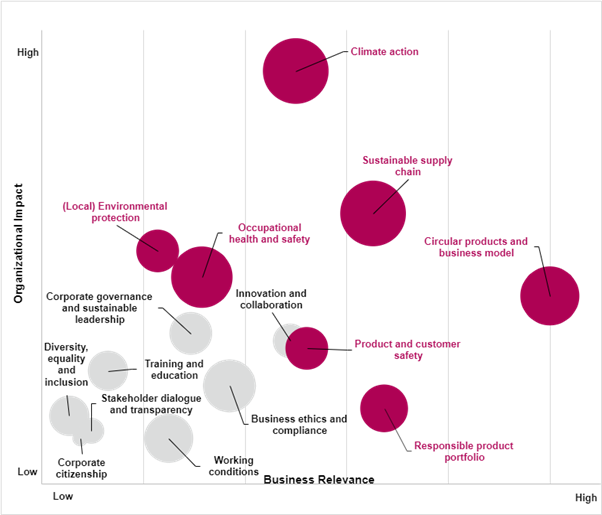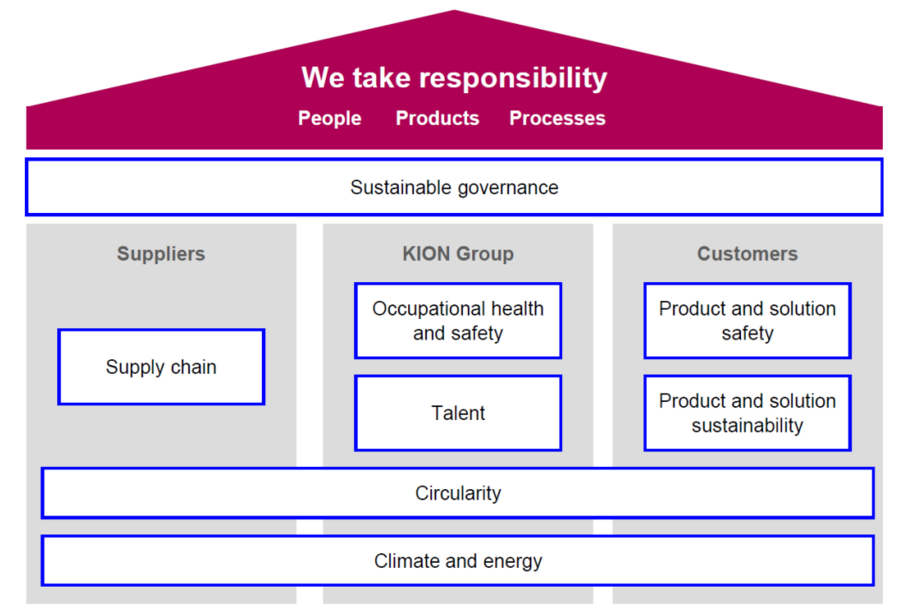Sustainability Strategy and Management

Sustainability has been a firm fixture and defined area of action within the “KION 2027” corporate strategy for many years. In implementing its sustainability strategy and underlying sustainability program, the KION Group has chosen to adopt a systematic Group-wide approach.
As part of the KION Group, STILL complies with the principles and policies for sustainable business practices in place across the group. Sustainability criteria have also been firmly integrated in operational business activities by implementing company-specific guidelines and procedures. These include guidelines for integrated HSE (health, safety, and environment) management and certification in line with labor and environmental standards (ISO 14001, ISO 45001, and ISO 50001).
STILL’s sustainability approach is based on the materiality analysis for the KION Group. This assessment, which was updated in 2022, identifies and evaluates material issues that may be relevant to the Group—including with respect to the UN’s Sustainable Development Goals—and is based, among other information, on the findings from global surveys of key stakeholder groups. Topics are assessed with regard to their relevance to the KION Group from three perspectives: relevance to the business (outside-in, opportunities and risks for the Group’s business development), impact of the organization (inside-out, impact of the Group’s business activities on the environment and society), and relevance to stakeholders (importance with regard to the development and shaping of expectations and decision-making on the part of stakeholders). Based on this materiality analysis, in the 2022 reporting year, the KION Group redefined and developed eight closely related action fields on sustainability across its value chain. We are planning to review the materiality analysis again in 2024 in view of the upcoming entry into force of the new EU Corporate Sustainability Reporting Directive (CSRD).
Group-Wide Materiality Analysis

Guiding Principles and Fields of Action
STILL’s sustainability approach is defined through overarching targets and initiatives under the three strategic dimensions of people, products, and processes, as well as the overall principle of “taking responsibility.” These three dimensions provide the framework for the business’ eight targeted areas of action on sustainability. In line with the KION Group’s sustainability strategy and materiality analysis, STILL pursues a specific program of targets, initiatives, and monitoring within each of these action fields, in order to meet stakeholder expectations and ensure compliance with political and legislative requirements.
Group-Wide Action Fields

Company
STILL is a leading supplier of internal logistics solutions, with a portfolio that includes forklift trucks, warehouse trucks, networked systems, and support services. Founded in 1920 by Hans Still, the company’s hallmarks include targeted, tailor-made solutions backed up by outstanding service. STILL has set itself the goal of making intralogistics processes ‘smart’. To this end, the company develops intelligent solutions with the aim of creating warehouse management workflows that are smoother and more efficient. These workflows provide more effective protection for workers’ health while ensuring the company can meet the highest standards of sustainability. STILL is thus forging ahead with new solutions for electric vehicles and automation—from fleet and energy management through circularity, which refers to the approach of consistently conserving resources and recycling the materials used. STILL’s ethos is to be a smart and dependable intralogistics partner. The company offers a wide-ranging portfolio of vehicles, systems, and consulting services that ensure every customer receives custom solutions designed to meet their precise needs.
In addition to selling new products, STILL also offers used trucks and rental options. With an extensive fleet of over 35,000 rental trucks, the company has a solution for every customer requirement.
Sustainability Organization
In implementing its sustainability strategy, STILL follows the systematic approach defined by the KION Group. Specific strategic and measurable sustainability targets have been defined for each of the eight action fields and the most important levers and KPIs identified. Detailed action plans have also been devised to put the targets into practice (for more information, see the KION Sustainability Report 2023). The individual targets, sub-targets, and corresponding measures are reviewed at regular intervals, including to ensure they are aligned with external requirements, the different action fields, and with internal stakeholder requirements at Group level and within the Operating Units.
The leads for the individual fields of action and the regional sustainability coordinators in the KION Group work together with central sustainability management as part of a steering committee. Together, they ensure that the sustainability program is consistent across the Group, continually enhanced, and implemented. The KION Group’s central sustainability management team is also responsible for managing and coordinating the sustainability program across the Group, defining sustainability KPIs, and tracking progress towards strategic targets and objectives within the action fields. Moreover, the team is available to provide specialist support for both internal and external parties.
Progress is monitored regularly, both at Group level and within the Operating Units (for example, as part of steering committee meetings), and reports are issued to the KION GROUP AG Executive Board. On May 1, 2023, a newly created Chief People and Sustainability Officer was appointed to the Executive Board, taking over the responsibilities of the Labor Director in addition to responsibility for sustainability matters.
Initiatives
In 2023, KION announced its official commitment to the Science Based Targets initiative (SBTi), with a view to achieving the long-term climate target of net-zero greenhouse gas emissions across its value chain by 2050. The Group has also set itself key interim targets for 2030 (see targets outlined in the KION Sustainability Report 2023). STILL thus has a basic methodological framework for its climate action and is committed to the target of limiting global warming to 1.5 °C above pre-industrial levels, which was adopted at the United Nations Climate Change Conference in Paris in 2015. After announcing the official commitment in 2024, the KION Group will update its climate targets in line with SBTi criteria.
As a supplier, STILL has undergone regular corporate responsibility assessments and certification from the independent and internationally recognized ratings provider EcoVadis since 2012. Having received an impressive Gold rating from EcoVadis in recent years, the company continued its winning streak in 2023, achieving a Platinum medal—the highest possible sustainability rating—for the second time in a row. This outstanding result puts it among the top 1% of all EcoVadis rated companies. STILL’s scores were above average across all four categories on the EcoVadis scorecard. In the “Environment” and “Labor and Human Rights” categories in particular, STILL scores nearly double the average for all rated companies, and its results in the “Ethics” and “Sustainable Procurement” categories are also excellent. The EcoVadis assessment is based on 21 criteria across the four categories and is calculated in line with international sustainability standards such as the Global Reporting Initiative, the ILO Conventions, the UN Global Compact, the UN Guiding Principles on Business and Human Rights, and the ISO 26000 sustainability standards.
STILL is also part of the Blue Competence initiative organized by the German Mechanical Engineering Industry Association (VDMA), which aims to promote sustainability in mechanical and plant engineering and inform the industry about sustainable solutions. As a partner to the initiative, STILL agrees to comply with the initiative’s 12 guiding principles for sustainability in the mechanical and plant engineering industry.
In addition, STILL is part of UmweltPartnerschaft Hamburg, a large network of companies committed to protecting our climate and environment in the long term. Faced with the realities of climate change, the network particularly wants to help advance the energy transition by reducing energy consumption and promoting new approaches to material flow management in order to make more efficient use of available resources. By 2030, the city of Hamburg aims to cut its CO2 emissions by 50% in comparison to 1990 levels; and by 2050 it plans to increase this figure to at least 80%. As an active member of UmweltPartnerschaft Hamburg, STILL is playing its part in combating climate change by implementing its energy policy in line with its DIN EN ISO 50001 certification.